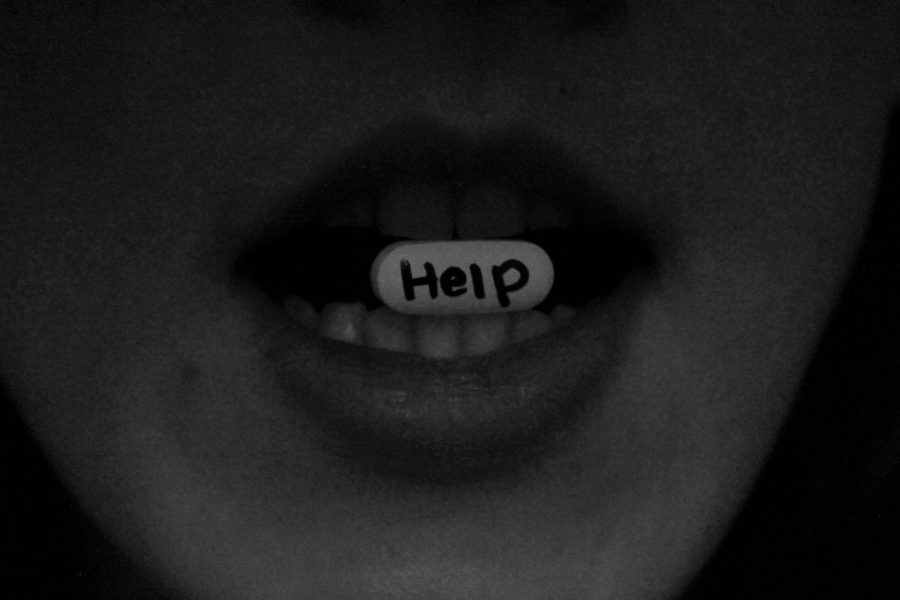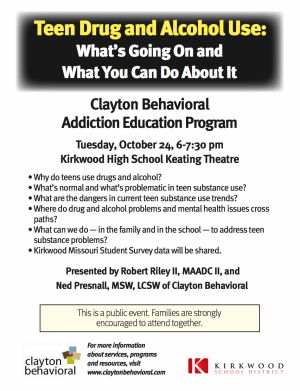Getting help
Stigma around drug abuse can make it more difficult for people struggling with addiction to seek help.
This story discusses topics that may be difficult for some readers, including substance abuse and addiction. If you are struggling with addiction, contact a counselor or call the SAMHSA hotline at 1-800-662-HELP (4357).
*Names have been changed for privacy
Kirkweed. Many students are familiar with KHS’s notorious nickname. While rumors of drug use at Kirkwood may be well known around St. Louis, solutions for students struggling with addiction may not be as common as 65% (176/271) of KHS students think Kirkwood does not offer enough resources for students struggling with drug addiction. John Smith*, freshman, said the stigma surrounding drug addiction made it difficult for him to find people willing to help while he was struggling.
“It’s hard to get help [when you’re dealing with addiction] because it feels like no one understands what you’re going through,” Smith said. “It causes your parents, friends and peers to get frustrated with you when you do something wrong. You’re always getting blasted over the head with negativity, but you can’t do much correctly because you’re dealing with [addiction] in your life that is negatively affecting you.”
Michael Bergman is the director of resources and peer support specialist at MoNetwork, an organization that focuses on education about substance abuse and support for people struggling. According to Bergman, the stigma and language used when talking about addiction can cause barriers to getting help and recovery.
“Previously, the only practiced treatment for those with Substance Use Disorder (SUD) was complete abstinence,” Bergman said. “That came with a lot of shame-based language. A lot of 12-step groups (recovery programs for people with addictive or other behavioral problems) used language like ‘clean’ versus ‘dirty’ and ‘addict.’ Those programs have worked for many people, but a lot of other [people struggling with addiction] aren’t in a place where they are ready to take that step, so let’s find a way to keep them safe.”
Chad Sabora, former prosecutor in the Chicago DA’s office and recovered addict, started MoNetwork to help other people recover from addiction. The organization hosts recovery groups, family support groups and peer counseling. They also hold weekly distributions of clean syringes, cotton filters, tourniquets and Naloxone, a nasal spray that can treat narcotic overdose in an emergency. Bergman said this strategy to treat substance abuse is known as harm reduction.
“Harm reduction is a loving way of treating people who use drugs,” Bergman said. “The idea with harm reduction is you meet people where they are. The [old definition] of recovery was actively trying to stop using or stopping using. It has since been broadened to any positive change in a person’s life. Say someone is [using dirty needles or unclean water]. Getting them to come and in start to engage with us, getting clean needles to reduce the risk of infection and mitigate the spread of HIV and [Hepatitis-C], bringing in old needles — those are positive steps.
Harm reduction can be an effective strategy to help people struggling with addiction. However, Angela Scheer, AP Psychology teacher, said harm reduction is not in the current AP Psychology curriculum, even though there is a unit about drugs and substance abuse.
“The AP [Psychology] curriculum is very bare bones [when it comes to drugs],” Scheer said. “It is classifications of drugs, how does cocaine impact reuptake and that’s pretty much it.”
Scheer attended a conference held by Clayton Behavioral on modern research about drug addiction. She said she used information from the conference to put together a lesson educating students on harm reduction and other aspects of substance abuse not discussed in the curriculum.
“The first year [I taught the lesson], the student reaction was ‘Wow, this is controversial stuff.’ This year, it’s becoming more accepted in general,” Scheer said. “A student this year came up and said ‘Thank you for talking about this.’ That student felt like this is something we don’t ever discuss.”
Scheer said she was glad to be able to teach students information they had never learned about in other classes. However, she said she also had personal motivation for teaching this lesson.
“I had two students die of overdoses in one year of teaching. That was a turning point for me. I really struggled to deal with that emotionally. I felt like I had no power and was trying to take back a little of that power [by teaching about addiction]. Anything we can do to reduce the stigma [around addiction] is important.”
While educating students about substance abuse helped her deal with her own emotions, Scheer said she also believes it can benefit students. According to Scheer, talking about addiction can help reduce the shame students may feel about their own experiences with addiction.
“As a student, if you have a parent or family member who’s struggling [with addiction], the current norms and expectations in our society can make you feel ashamed,” Scheer said. “I think anything we can do to help alleviate that is important. We also have to recognize it as a mental health struggle. People need mental health assistance to address [addiction], not shame and berating and ostracism.”
Bergman said treating addicts with kindness rather than shame is important. He said even small acts can make a huge difference in someone’s life.
“Even if I make someone laugh or smile when they come in for needles, just letting them know ‘Hey, I’m not judging you. I love you where you are,’ makes a difference in their lives,” Bergman said. “[They shouldn’t] be ashamed — [addiction] is not a moral failing, it’s a mental health issue.”
While ridicule from others can make getting help feel daunting, self-shame can be just as detrimental. Smith said viewing addiction as his own personal failure made finding help more challenging.
“My dad didn’t think I needed any help. He thought I was perfectly fine and [getting outside help] wasn’t going to benefit me in any way,” Smith said. “[Looking at it like] it’s an issue with you, when it’s an issue with where you are mentally, [is harmful].
Smith said he was able to get help and take steps toward recovery. He advises anyone in a similar situation to him not to be afraid to ask for help.
“I was able to overcome [the stigma],” Smith said. “It wasn’t the easiest — for a few months I was doing IOP (intensive outpatient programs) and everything I could to stay away from really any type of medication. [My advice] to anyone who’s struggling [with addiction] is to not be afraid to talk to people about it. Whatever you’re struggling with, try and get help with it.”
Bergman said seeking help can come with shame. However, he also said finding resources is an important step in recovery.
“Don’t let the stigma kill you,” Bergman said. There are resources out there to help you.”
Resources for students struggling with addiction:
1. MoNetwork: 844-REBEL-UP or contact Michael Bergman at michael@monetwork.org
2. NCADA GuidEd: https://prevented.org/resources/guided
3. Preferred Family Healthcare: https://pfh.org/substance-use — South Country location focuses on adolescent substance use
Your donation will support the student journalists of Kirkwood High School. Your contribution will allow us to purchase equipment and cover our annual website hosting costs.

she/her
Hobbies and Interests: writing, reading, swimming, rowing
Favorite Song: The Adults Are Talking by The Strokes
Favorite Quote: “If people...

she/her
Hobbies and Interests: photography, hiking, jewelry making, hanging w my friends
Favorite Song: "Santeria" by Sublime
Favorite Quote:...











